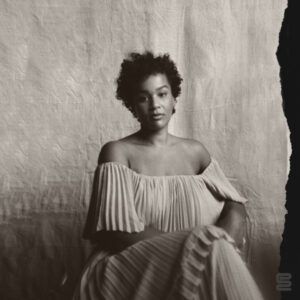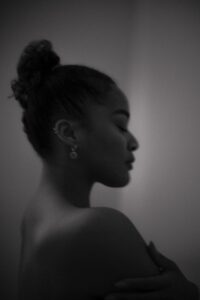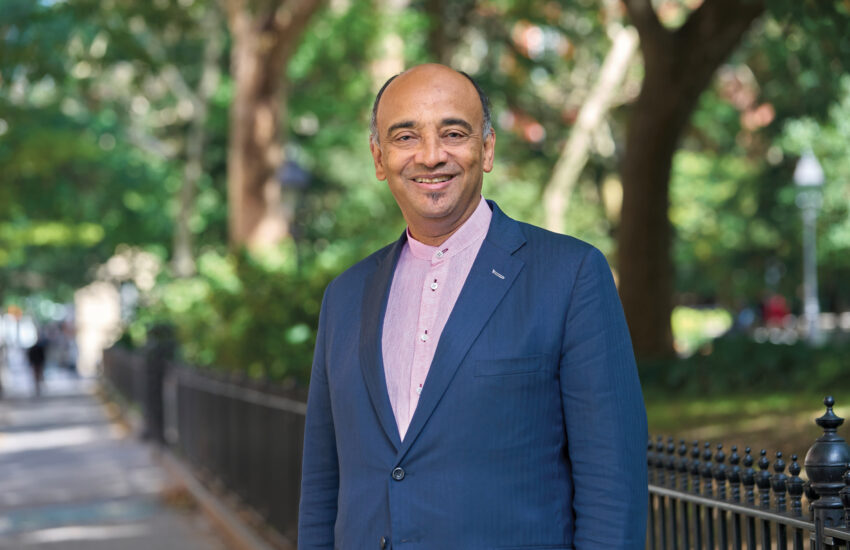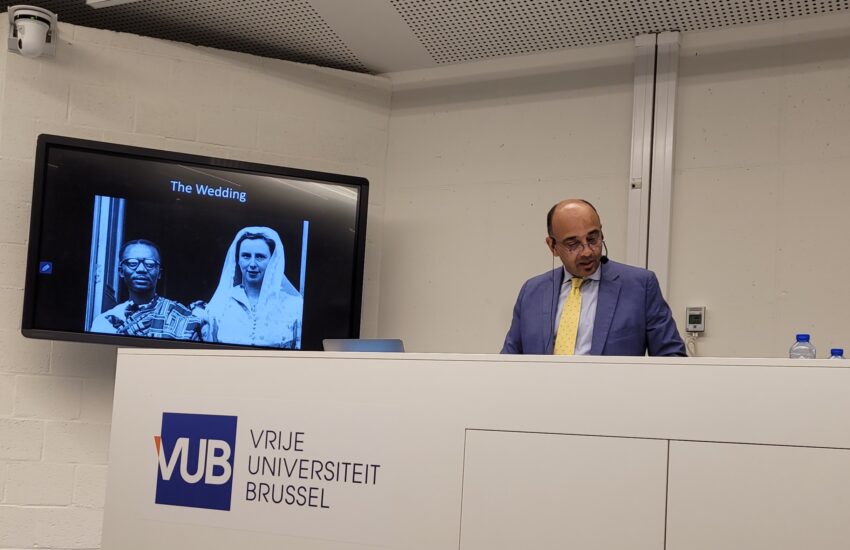“…All that I’m doing is an authentic expression of who I am…”: An Interview with Frida Touray
Written by Tola Ositelu
You’d be hard pressed to find a more thoughtful and deliberative artist than Gambian-Swedish singer/songwriter, Frida Touray. This introspection came through immediately when her striking EP Mending landed in my inbox back in summer 2022. It’s again evident in the reflective silences between answers, as she joins me for a virtual interview from her adopted home in London. Touray asks to see the questions beforehand to prepare. Request declined. It’s something she laments more than once.
In some ways her considered, not to mention succinct, approach is a gift to journalists. There’s so little that is extraneous. It saves a lot of editing time.
It’s not that Frida is uptight, as such. Rather, cool-headed and pensive in a way that one might readily associate with Nordic stereotypes. “It’s the Swede in me,” she says, good-naturedly.
Frida was born and raised in the land of Fjords, moody Jazz, Volvo and ABBA. Her artistic proclivities manifested as early as four, according to her music-fan mother.
“My mum loved Reggae, the Blues and American Rock” she remembers, “There was also Swedish Pop and traditional music that came with what my grandmother would listen to, as well as being part of choirs.”
Touray joined her first chorale at the tender age of six.
“I think that’s where I really fell in love with Swedish melancholy in melody. That was ingrained in me at an early age.”
An interest in Jazz came much later.
“There was never any Jazz growing up. My mum famously said when she was younger that she didn’t like it. I think she’s distancing herself from that statement now,” Frida adds affectionately, as if to defend her mother’s musical honour. She continues: “I discovered Jazz between the ages of 18 and 22. It was partly moving to London and starting to play with Jazz musicians. Also listening to a lot of Hip-Hop, R&B and Neo-Soul – Erykah Badu, the Soulquarians…”
By Touray’s admission, she had a somewhat peripatetic childhood. Originally from Northern Sweden, her family – including two older sisters – moved around a number of times.
“I grew up mostly in small towns in Sweden,” she recounts. “It wasn’t until I started school that I began to feel I was different. I think any kid at a certain age really wants to fit into a group but, being mixed, that feeling was always amplified for me. It was as if I had to ‘work my way’ into belonging.”
Frida would spend much of her adolescence near Sweden’s Southern coast. The move represented a significant (multi)cultural transition.
“When I was 10, we relocated down South to a bigger city. I attended a school where the majority were POC and second-generation immigrants. It was a shock to the system but also the first time I felt like I wasn’t on my own. I am super grateful to have experienced so many different cultures in my teens.”
A self-described introvert, emigrating to London was a big leap for Touray. She once went as far as to call it a matter of survival…
“I think ‘survival’ was a tad dramatic,” she laughs. “I’d finished high school at 19 and started working in a food shop in a really small town in Sweden, not much going on. [Moving to London] wasn’t even a choice. It wasn’t like I was thinking ‘Should I be doing this?’ I knew I had to. I wasn’t going to stay where I was. I felt there was more I needed to do with my life. I took the opportunity when I heard about BIMM institute.”
There was never any doubt about her career path.
“I always knew that I’d make music, from the age of four. I never wondered what I was going to do with my life. I inherently knew this is who I am and that that would carry me through life.”
Whilst studying at BIMM, Touray shared a flat with fellow musicians. It was formative.
“More than anything I felt we were discovering London together,” she reminisces. “It was almost all about music. It was everything in our lives, in a more intense way than it is now. I feel like London can be a harsh city sometimes. Discovering it alongside people that were sharing in your journey, that was quite special.”
Returning to the topic of Frida’s craft specifically, her vocals are both understated and stunning. Her voice is suffused with the colour and texture of a few greats – India Arie and Lizz Wright for tone or Mariah Carey’s dynamics, for instance – yet Touray retains her individuality. Three female artists in particular have left an indelible mark.
“Definitely Beyoncé,” Frida cites, without hesitation. “The way she carries a melody and how she phrases things. I’ve listened to her so much, it’s really informed the way I sing; the way I interpret melody and especially rhythm. I also remember listening to Eva Cassidy and the delicacy she has in her voice when she performs. Ella Fitzgerald…”
Those sensibilities most certainly come through…
“For me, it’s more than just the vocals,” Frida resumes. “It’s the way they communicate what they’re trying to say. I was always really interested in singers that have delicacy and intimacy in their voice. I love Big Voices as well. Obviously, Beyoncé is a big voice but you feel like she’s singing just to you. There are many more [influential singers]. It’s an impossible question in a way…”
Touray is also part of Native Dancer, an experimental Soul-Jazz outfit. Her solo work is more in the Acoustic Soul-Folk vein. How does the experience differ going it alone, aside from the slight genre shift?
“Writing lyrics is a solitary experience for me most of the time,” she explains. “Even if I’m in a room with people, I have to go inwards a bit for the words to come out. As for the shift between genres… I love artists that express themselves freely and don’t think about putting themselves into boxes. In fact, that’s always been our ethos in Native Dancer; beyond genre. I know that might sound a bit pretentious but…”
Not necessarily. It’s eclectic. Genre-fluid.
“Exactly! I believe that human beings are multi-faceted. We are so many things. All that I’m doing is an authentic expression of who I am. I try not to judge or think about it too much. I’ve listened to a lot of varied music in my life and I love all of it. It’s influenced me in so many different ways…”
She takes another studied pause.
“…What do I think it is? It is what it is, I guess. It wasn’t like I started out my solo career saying ‘I’m going to think about it in these terms, or in these genres’. It was following what my ears, emotions and spirit wanted it to be, if it fit with what I wanted to say. Does that make sense?”
Mending is a musical memoir. On the EP sleeve notes, Frida outlines the record’s themes: “… about a journey through love and relationships. How you evolve through them and, sometimes, how painful and intense they can feel when everything feels unaligned…”
Touray wouldn’t be the first to release something so personal. Yet it’s no less brave to be that transparent so early in her solo career. Were there any qualms?
“It was definitely scary at times to be that vulnerable,” she admits. “But I also know what I appreciate when listening to other artists. Baring yourself and being vulnerable can be a really freeing and beautiful thing to hear and be part of with someone. I needed to get these feelings out with this EP. I felt if I could make something beautiful in each song, then all that turmoil wasn’t in vain. I’d have done something with it that I was proud of. That really motivated me.”
The record is not stuck in some romance-turns-sour loop. Relationships are explored from diverse perspectives. On first listen for instance, Wild – a personal favourite – is a beautifully haunting homage to friendship. Yet again, the song functions on multiple levels.
“I had a friend in mind when I wrote it [but] I was writing it for both myself and this person. We are very similar. It was an ode to them. I wanted the song to be like a hug. Everything about it needed to feel like ‘You’re going to be okay. I’m here’, even if that is me talking about it as a support for myself.”
The soulful melancholia of Touray’s Scandinavian roots is all over her music. Do elements of her West African heritage also come into play?
“I think so. It must do,” she asserts. “I remember my dad listening to a lot of Gambian music. I also heard a lot of Youssou N’Dour growing up. I don’t speak Mandinka or Wollof but that makes it more interesting. The way N’Dour sings, there’s such incredible storytelling in his voice. The emotions that he’s trying to convey really came across to me when I was little.”
She elaborates “I believe the rhythm from my dad’s heritage is in my spirit; the way he passed down his musical legacy to my ears when I was younger. I’m yet to discover that musical part of me. It’s necessarily to come.”
Frida has sung, collaborated and toured with the likes of Lianne La Havas, Liam Gallagher, Coldplay, Laura Marling, NAO, Goldie, Jordan Rakei – of whom Touray is a huge fan – Tom Misch and many more. Amongst the illustrious list, working with La Havas stands out.
“Lianne taught me how to take pride in being a backing vocalist; feeling like I played a big part in the band,” she recalls. “That made me feel very proud to be a vocalist in general. Lianne was very particular about what she wanted. I was happy because I wanted to learn, do a good job and to test my vocals. She was the first big tour that I got. It was life-changing in so many ways.”
Despite being an artist in her own right, Touray retains a fondness for backing vocals.
“I love singing for other people” she shares. “It’s such an interesting way of using your instrument; almost like having to get into someone else’s creative psyche. Blending in with people’s voices is a challenge that will always bring me a lot of pleasure.”
Nonetheless, in the past Frida has confessed to the fear of losing her own vocal identity when working with others. Is that something that gets easier with age?
“I believe it’s changed in the last few years. I feel a lot more confident in my own voice. My solo project has really helped to ground me. It’s part of my job [singing BVs] to mould myself to someone else’s voice. It was a bit confusing sometimes when I was coming up,” she chuckles, “but I feel a lot more secure in my own thing now.”
One of the negative aspects of the music industry, according to Touray, is how much room is made for men whilst women seem obligated to compete for less spotlight. As an Afrodescendant woman, has she observed particular challenges in that regard?
My question is followed by the longest ruminative pause. Just as I wonder whether to repeat it, Frida stirs.
“Hmm. Well, it’s complicated, isn’t it? As a backing vocalist, people of colour – women of colour – rule the game. They’re most of the people I work with. That comes with its own difficulties… In my experience, we’re also the least paid part of the touring team.”
She continues to weigh her words carefully.
“I know there are things that go way deeper than just the music industry and my own experience of being a racialised woman in it. There are so many layers. I personally have been all right and done well in my career. In my experience, I haven’t had that difficulty. That could be because I’m light-skinned. [Colourism] is another layer, for sure… Like I said, most of the people I work with are WOC. That’s different from the rest of the band for example, where most of those whom I’ve worked with have been white men.”
Frida reflects further: “It depends on what area of music you’re talking about. There’s been a real emergence of young black Jazz musicians in the last 10 years, for instance. I think it’s incredible for that particular scene which has been very white and collegiate, you know? Also, when you talk about the session scene it’s a little bit different. I always want to advocate for more women in music and definitely more black women. The culture needs to change. I remember partly why I loved artists like Destiny’s Child, Aaliyah and Brandy growing up. I saw myself in them. I think it’s important for people to experience themselves in their idols. We definitely need more representation.”
This is consistent with Frida’s democratic, non-elitist approach to art more generally.
“People always think you’re only an artist when you’ve reached a certain level of numbers on Spotify or Instagram. If you’re presenting as an artist…it goes beyond what you’re just presenting as a brand. Music is way deeper than the marketing campaign.”
Frida is candid about the insecurities the music industry engenders. Art is personal by nature. Creatives can be deeply affected if their work is not well received or misunderstood.
Over time, she has found an equilibrium.
“Working with artists, leading my own band, releasing music and seeing the industry from different angles has really informed how I feel about ambition; what artists need to do to succeed. I’ve also seen the industry change for artists, especially after Brexit and the pandemic…”
Frida has nevertheless remained unjaded in spite of these seismic events.
“I’m honestly not disheartened at all,” she insists. “I love writing and releasing music. I just have a more sobered and genuine view of what makes me happy. Playing into a game that’s not meant for you to succeed or breaking through different walls at every turn, is not what I want to be doing. I was trying to do that at some point, in my early-mid 20s, but it wasn’t making me happy. Thinking about different invisible forces over which I have no control and following a template of PR and marketing… I’m not that person. I get too overwhelmed by life so I need to just follow my own path. What makes me happy is writing, recording and sharing music; playing live.”
Speaking of which, 2022 was significant for Frida on the live front. She has not long come off a promotional tour for Mending. There’s hopefully more on the horizon in 2023, as she looks to release new material.
“I’m focusing on writing at the moment; both for Native Dancer but also my own project,” she divulges. “I’m just gathering creativity and information about what I want to say, laying the foundations. Right now, in terms of scheduling, my life is an open book.”
Mending EP by Frida Touray – out now
This interview originally appeared on I Was Just Thinking…





